#jingoism
Explore tagged Tumblr posts
Text

Hey, so if we're going to do stupid jingoistic rebrands—and kudos to the person who brainshat "Gulf of America" because you, sir or madam, have distilled the very essence of "stupid"—can we bring back "freedom fries"? Because if we're going to be a tragic burlesque of a nation, I think we need to go the full monty.
23 notes
·
View notes
Text

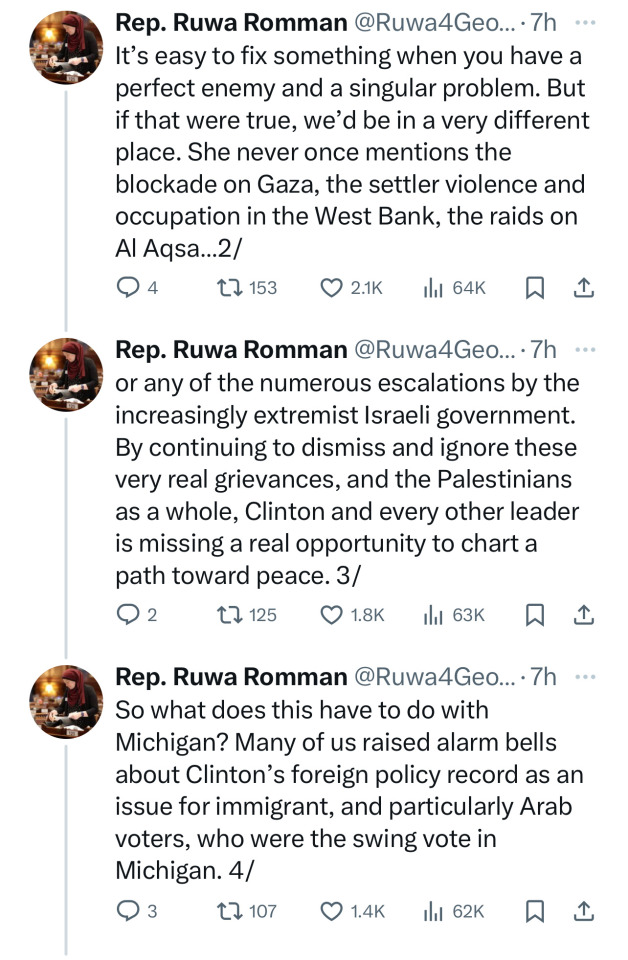
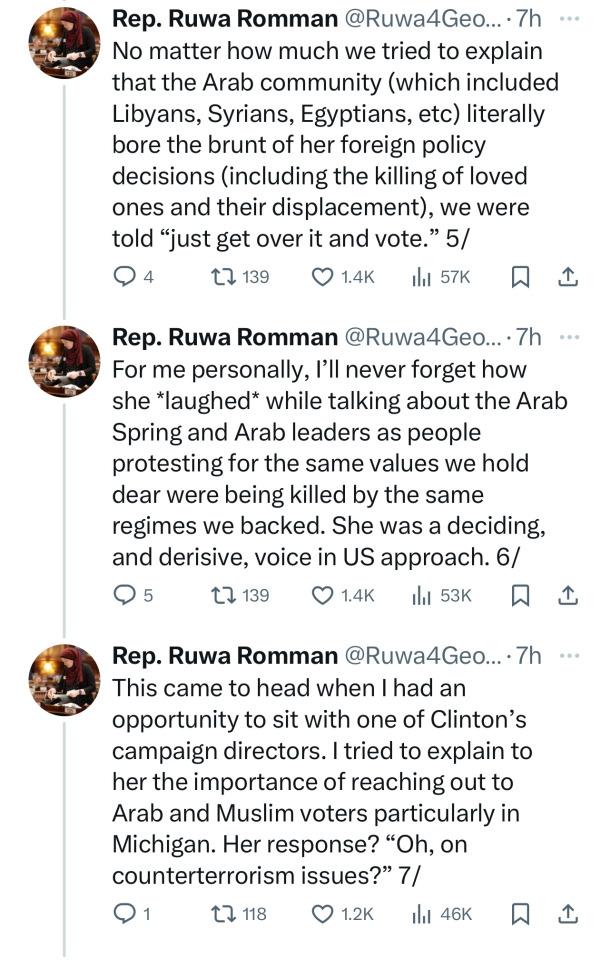
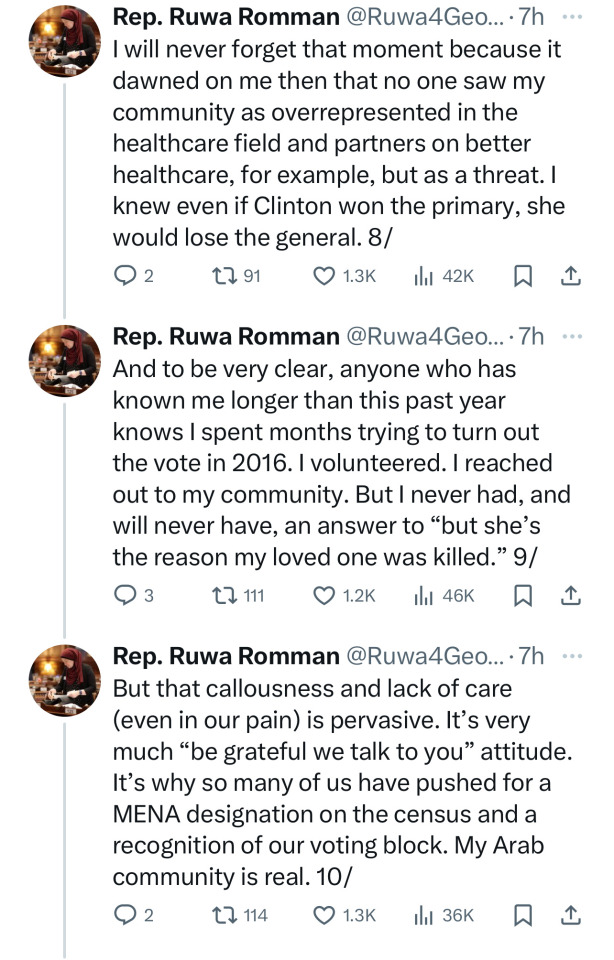
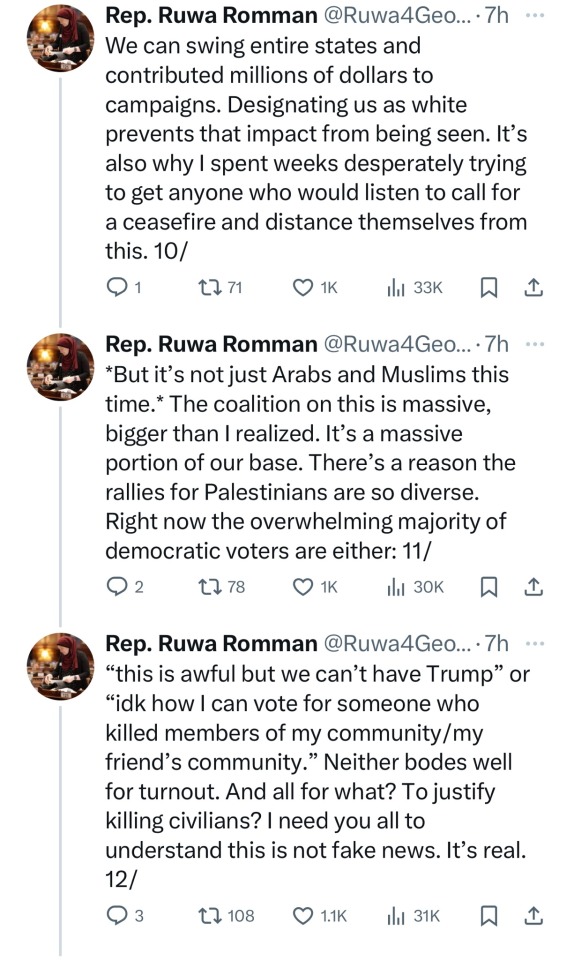

HILLARY CLINTON has a long track record of being on the wrong side of almost every major foreign policy decision in American history. Once a jingoistic warhawk, always a jingoistic warhawk, I guess.
Ruwa Romman is right.
And to be super clear: Hillary Clinton is dead wrong about not allowing even a ceasefire, because according to her, halting the genocide and not killing even more Palestinian children would somehow hurt Israel.
The best thing that the Democratic Party could do would be to get rid of all traces and any influence of the Clintons.
#politics#hillary clinton#palestine#ruwa romman#israel#gaza#jingoism#ceasefire#ceasefire now#war crimes#genocide#warhawks#clintonism#israel is an apartheid state#benjamin netanyahu is a war criminal#bds#boycott divest sanction#hamas ≠ palestine#never again#never again to anyone
117 notes
·
View notes
Text

"US Constitution" Soviet Union c. 1970s
#united states#usa#america#gun#poster#vintage#anti imperialism#police#state#imperialist#colonialist#jingoism#propaganda#ussr#russia#soviet union
133 notes
·
View notes
Text
Ecofascism and Rewilding: A Conversation With Ariel Kroon and Christina De La Rocha
There’s no question that the biosphere is in crisis right now thanks to human-driven global warming, our hostile takeover of most of Earth’s land area, and our pollution and overfishing of the seas. Slowing down—never mind outright stopping—the collapse of the Earth’s ecosystems and the mass extinction currently gaining pace calls for aggressively protecting the environment, or possibly even giving half of the Earth’s land surface back to nature in a process known as rewilding.
But how will we manage to share the Earth with the rest of the biosphere when history shows that we’re pretty terrible at sharing it with each other, with some states even going so far as to have used the preservation of wilderness as a tool of genocide and white supremacy? There are still those who would use environmental protection as an excuse to block immigrants, reject refugees, and expel “undesirable” people from the land. What will it take to value human and non-human life and the land all equally, without using one as an excuse to persecute the other?
Getting urgently-needed environmental protection and rewilding right requires facing the evils that have been historically committed in the name of conservation, so that we don’t repeat those grave mistakes, even with the best of intentions. As solarpunks, we need to learn from the past in order to shape futures that are intentionally better than our pasts and presents.
And that’s a wrap for season 2! Season 3 will be coming along in the last week of June for Patreon supporters, and to the public in the first week of July. Until then, keep dreaming, and keep up the good work!
Links
Reframing Narratives with Ecocriticism, with Dr Jenny Kerber
Against the Ecofascist Creep webzine teaching resource and explainer
Read about the 100-Mile Diet book and phenomenon on Wikipedia
Read about the locavore movement on Wikipedia
A great article on philosophical questions with The Sneetches from the Prindle Institute for Ethics
Some articles on food forests
The Half-Earth Project
#solarpunk#solarpunk presents podcast#ecofascism#rewilding#half-earth project#population#technology#wilderness#nature#biosphere#jingoism#human#non-human#environmental protection
11 notes
·
View notes
Video
tumblr
What this means for first amendment rights
#tiktok#Social media#internet#internet privacy#online security#online privacy#technology#Jamaal Bowman#congress#us congress#china#xenophobia#ACLU#first amendment#free speech#jingoism#democracy
109 notes
·
View notes
Text
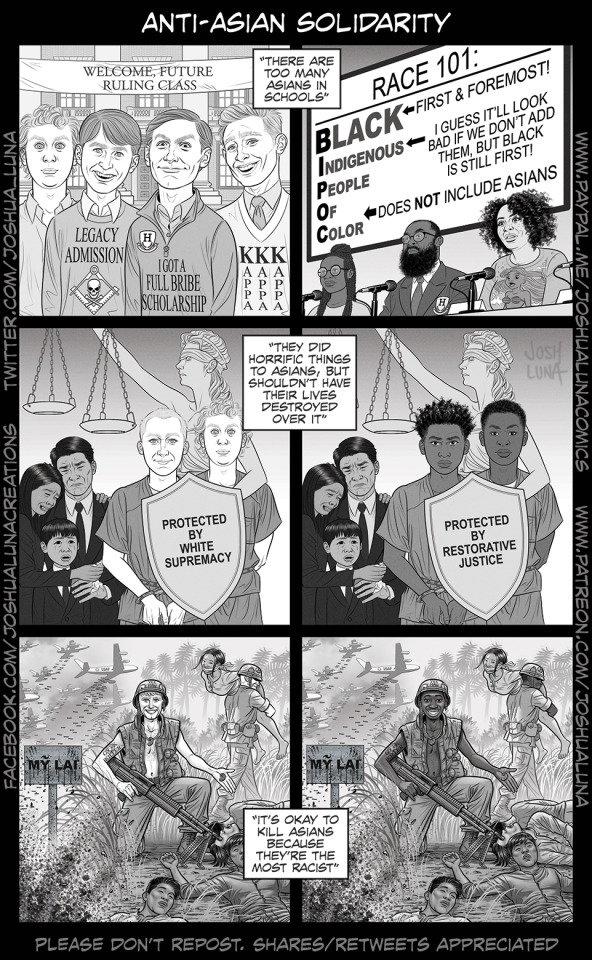
We often talk about how white supremacy uses the Model Minority Myth as a wedge, but rarely talk about how Black Americans adopt racism and jingoism against Asians domestically and abroad. (Please don’t repost or edit my art. Reblogs are always appreciated.)
If you enjoy my comics, please pledge to my Patreon or donate to my Paypal.
#anti asian racism#anti asian violence#anti asian hate crimes#Vietnam war#My Lai massacre#white supremacy#legacy admissions#affirmative action#bipoc#jingoism#legal system#restorative justice#artists on tumblr#my art#comic#filam artist#josh luna#joshua luna
67 notes
·
View notes
Text

McJingoism
#mcdonald's#mcdonalds#cheeseburger#hamburger#restaurant#fast food#ronald mcdonald#chicken mcnuggets#french fries#captain america#steve rogers#clown#clowncore#clownblr#captain greasecore#heart attack#jingoism
2 notes
·
View notes
Text
Important PSA:
Patriotism vs Nationalism vs Jingoism:
Patriotism: I love my country when she is right, I acknowledge my country when she is wrong
A patriot loves their country, celebrates when their country does good things, holds remembrance when their country disappoints them. A patriot from one nation can be friends with a patriot from another nation, and may even be patriotic for multiple nations. When their country achieves greatness, they are genuinely proud. When their country claims to achieve greatness but achieved nothing, they feel empty. A patriot typically values unity for all over prosperity for a few. They value the opinions of people critical of the country they love, and see constructive criticism as a form of love for their country.
Nationalism: I love my country, right or wrong, may she always do right
A nationalist loves their country, celebrates their country when their country does good things, and typically ignores or refuses to acknowledge that their country can do bad things. A nationalist believes their country is the best country to ever exist and thus may find it difficult to be friends with a patriot or another nationalist (for, only one nationalist’s opinion can be true). A nationalist rarely is nationalistic to more than one nation. A Nationalist cannot tell the difference between genuinely achieved greatness and false claims to genuine achieved greatness. A nationalist typically values unity for as many people as possible as long as it leads to prosperity primarily for them. They ignore the opinions of people critical of the country they love, often believing they are “fake news”.
Jingoism: I love my country, right or wrong, she is ALWAYS right
A jingoist loves their country, celebrates their country when their country does good things, and will celebrate their country when their country does evil by finding some way to make said evil good, for a jingoist believes their country is unable to be bad. A jingoist believes their country is the best country to ever exist and thus all other countries should be subservient to their country, if not outright invaded and forced into submission. A jingoist could never be friends with a jingoist from another country nor a patriot from another country nor a nationalist from another country. A jingoist does not care about the difference between genuine achieved greatness, false claims to genuine achieved greatness, or even acknowledgements of wrongdoings for their country is always correct no matter what. A jingoist could care less about unity, as long as they and other “real countrymen” are prosperous, that is all that matters. They hate the opinions of people critical of the country they love, and will silence and suppress them.
Examples:
Patriots: The vast majority of people in the vast majority of countries. Most Americans are included under this label, because, if there’s one thing most Americans can agree on, it’s how bad their country is (whether that be “our deficit is too high and we don’t take care of our vets” or “legalized racism is still a problem and the withdrawal from Afghanistan was too early”)
Nationalists: Extremists (eg Neo Confederates, Reagan obsessed conservatives) and many former colonial countries, including Japan, the UK, France, Spain, Turkey, China, Russia, and to a lesser extent, Belgium, Netherlands, and Portugal. For example, most Brits genuinely believe that the British empire did more good than bad, and Japanese history in schools paints Japan in WW2 as a victim. Similarly, Neo Confederates focus on the “greatness” of the CSA without thinking about the not so great parts of it… like, ykno, slavery. Note, this is not all the people of these nations, more their governments
Jingoists: Nazis, modern day Israel under Netanyahu, the propaganda media, and extreme Zionism, MAGA Anti-Woke WASP Americans, Putin’s inner circle, the KKK, and North Korea to name a few. It’s very cult like to say the least, and often genocidal.
The Fourth Category: I love my country when she is right, and I am disturbed when she is wrong, so I will focus on when she is wrong more than when she is right, because I believe righting these wrongs is more important than anything else, and that is how I show love for my country
I’m not sure what to call this category, and only two nations — Germany and Rwanda — fit within this category really, though their are minorities of people in other countries (namely, USA, UK, Canada, New Zealand, Australia, most Latin American countries, most settler colonialist countries, and Netherlands) who view their country this way
Be a Patriot not a Jingo!!!
#patriotism#nationalism#jingoism#usa#america#israel#from the river to the sea palestine will be free#palestine#Zionism#uk#ukraine#russia#canada#am yisrael chai#belgium#geography#politics#international#news#united nations#mexico#hamas#education#educate yourself#learning#semantics#flowes#frida kahlo#rocky horror picture show#music
10 notes
·
View notes
Text

Captain Atom ain't that bad of a hero now, fer a military man, but back in the Silver Age he wuz one a' the most nationalistic an' jingoistic heroes of the Cold War! His original Charlton run's unintentionally hilarious.
(Art sampled from "Justice League Europe" Vol. 1 #25 by Gerard Jones, Keith Giffen, Bart Sears, Randy Elliott, Gene D'Angelo, Bob Lappan, Kevin Dooley, and Andrew Helfer, Edits: Dialogue, Visual)
#captain atom#silver age#silver age dc#silver age comics#cold war#nationalism#jingoism#charlton comics#justice league#jla#kilowog#communism#usa#dc comics#comics#comic books#art#comic panel#90s comics#maybe he wasn't as bad as peacemaker or sarge steel but he was really bad
6 notes
·
View notes
Text
Scientific American: People in the U.S. Think They Are Better Than They Actually Are. People in Asia Don't
How competent are you, compared with your colleagues? When psychologists approach teams of coworkers with variations of this question, an interesting pattern emerges. If people have a truly realistic perspective of their abilities, then their self-assessments should generally fall around the middle. Instead psychologists have repeatedly found that people’s self-assessments are inflated. In fact, superstars and underperformers alike tend to think they are better than they truly are.
This effect is one example of a positive illusion: a cognitive bias that makes you feel more competent, more blessed, more fortunate and better than you are. Positive illusions seem intuitive and reasonable to many people. Some scholars argue that these illusions are fundamental to our species’ survival. To get by in life, they reason, you must remain optimistic, work hard, succeed, live long and leave offspring behind.
[Read more about the better-than-average bias]
Of course, some people don’t experience positive illusions and have a more realistic self-assessment. Unfortunately, such self-appraisals could make them feel more inadequate when comparing themselves with many others who have a very positive self-assessment. These comparisons may be an important cause of imposter syndrome—the suspicion that one is not deserving of one’s achievements. In other words, imposter syndrome may be the dark side of the societal norm toward positive selves.
But there is an important caveat to this discussion: the available evidence is based almost exclusively on a small fraction of humanity called Westerners. If positive illusions were truly essential to our species, we would expect them to be universal. But my work—and that of other research teams—suggests otherwise.
In the early 1990s my colleagues and I started our “Culture and the Self” project, exploring how the sense of the self might vary across cultures. We found no strong evidence for the better-than-average effect or other positive illusions in East Asia. In Japan, for example, when university students were asked what proportion of their peers were better than them in various traits and abilities, the average estimate fell around 50 percent.
In our newest area of research—cultural neuroscience—we find that the neural pathways that support positive illusions are absent in certain communities. In other words, a pattern that most psychologists have seen as a human universal is instead a product of culture.
The vast majority of the psychological database comes from so-called WEIRD (Western, educated, industrialized, rich and democratic) societies. Most scientists in psychology and other academic fields have a WEIRD cultural background. Therefore, the common view that positive illusions are a human universal is based on heavily skewed research.
To go beyond the limits of this WEIRD cultural perspective, my colleagues and I have directly compared responses from Westerners and East Asians to questions asking about the self. In one study published last year in the Journal of Experimental Psychology: General, both American and Taiwanese participants judged how good or bad they would feel when facing success or failure. Americans reported they would feel better about success than they would feel bad about failure. Meanwhile Taiwanese participants did not show this positive illusion: if anything, they reported they would feel worse about failure than they would feel good about success. This response from Taiwanese participants may reflect another psychological tendency called the negativity bias, in which negative events typically have much stronger emotional impacts than positive ones.
We then went a step further from past research by monitoring people’s brain waves as they made these judgments. Specifically, we looked at the magnitude of the “alpha wave”—a pattern of activity that appears when a person’s mind wanders and engages in internally directed thoughts. We observed the alpha effect when Americans thought about themselves within a fraction of a second after learning that something good happened to them. This early attention predicted the magnitude of their positive illusions. Taiwanese participants did not show this pattern when thinking about either success or failure happening to the self, nor did they show evidence of holding positive illusions, as mentioned above.
In East Asia, modesty is culturally valued. For that reason, some Western psychologists have tried to explain the absence of positive illusions by arguing that East Asians disguise their true feelings to avoid appearing too self-focused. But our data show that this explanation is inaccurate. We saw no added brain activity, for instance, that would correlate with effortful concealment of one’s true feelings among the Taiwanese people who participated in our study.
On the contrary, Westerners take an additional step to boost their good feeling when something good happens to them. They spontaneously maximize good feelings about the self through an automatic neural response. It occurs within a fraction of a second, without apparent effort, let alone any deliberation or conscious strategizing. Such a response might seem natural and inevitable, but it is not. Instead the response is cultural, having formed through years of socialization. The brain is extensively trained to produce this response because it supports attitudes that help a person fit into their individualistic culture, valuing self-promotion and initiative. East Asians show no such spontaneous or automatic response. They would seem to be more accepting of various events as those events happen to them. Other work we have done has found that while self-esteem predicts health in the West, it does not have the same consequences in East Asian societies.
When considering these results, it’s important to flag that findings about a whole culture or community are nuanced. Within a given group, there can be a high degree of variation from one person to the next. As previously mentioned, some people in the West experience imposter syndrome, which could be especially problematic, given this culture’s strong normative emphasis on feeling positive about the self. This example demonstrates why we cannot assume every Westerner or East Asian will follow a set pattern. But in broad terms, when we see these kinds of trends in our research, we have an opportunity to learn more about how culture shapes the brain and behavior.
We think the cultural variation in positive illusions is one example of a broader cultural difference in how the self is construed. Western societies generally regard the self as independent. Consequently, people in these societies are motivated to feel good about themselves. They work hard to identify their competence and uniqueness. In many cultures outside the West, however, people regard their selves as interdependent and embedded in social relationships. They feel protected and secure when connected to a larger social community. From that cultural perspective, there is no need to feel particularly good about one’s independent, individual self.
These differences set the stage for all manner of misunderstandings. From the Western perspective, East Asians might appear excessively polite in their attention to social ties or could seem disengaged or even depressed or maladjusted in their ambivalence toward self-promotion and initiative. Our data, however, show that East Asians respond to events naturally and realistically, without extra thought. From the East Asian perspective, the Western tendency to boost good feelings about oneself could come across as futile, unnecessary or even childish because it shows how the person is failing to appreciate the relational nature of the self. But our data suggest that Americans boost their positive selves because it helps them adapt to their culture. Altogether, by adopting the cultural neuroscience approach, we may keep our cultural preconceptions and biases at bay, thereby making our science less ethnocentric.
Stepping back, this work underscores the power of culture. Humans are the only animals that have survived by creating and taking advantage of various conventions, practices, meanings and social institutions. The evolution of these things, summarily called “culture,” has accelerated, especially over the past 10,000 years, forging several major cultural zones today. These zones vary greatly, and the cultural variation in positive illusion is a single instance, albeit an important one, of a more general process by which our culture shapes our ways of thinking, feeling and acting. We know what our culture is. Yet we don't appreciate its mind-shaping power enough.
#JINGOISM#People in the U.S. Think They Are Better Than They Actually Are. People in Asia Don't#americanisms#asianisms#cultural deadzones#asian perspectives#culture#western culture#eastern culture
7 notes
·
View notes
Text
#lol#accurate#whitewashing history#american exceptionalism#jingoism#revisionist history#historical revisionism
144 notes
·
View notes
Text
from In The Presence Of Absence // Mahmoud Darwish
You cried like never before. You cried with all your senses. You cried as if you were not crying, but melting all at once and raining. So I gathered you up and carried you to your tiny apartment on the eighth floor of a building that looks out to the sea where the ships will sail. Everything was crying. The low sky. The bullets bidding farewell to the fighters were crying. The streets were crying. Balconies, ruined buildings, slogans on city walls were crying. Rendezvous cast into the realm of the possible and impossible were crying.
I left you and went out to cast a farewell gaze on those who were trained to hide their tears and who waved their guns smiling. I was pained by the heroes' victory signs raised by hands whose missing parts they had not noticed. I heard chants accompanying heroism to new beginnings. An idea is an ember. The path is the search for the right path. We will survive and triumph. I can no longer weep. Anger has scorched my tears. I can no longer look at the present, because zeal has lifted me to its highest paths and tomorrow's sun has illuminated my tunnels. As if I were stronger than myself as long as the beginning remains alive in us, and so long as there is enough of the cloud's density when it drips and rains to water a desert. Such are the traces of injustice in us that we need not seek justice with the elucidating eloquence of the tongue. The sea is no longer unknown and the howling of sailing ships has ceased. I cry out: From every port we begin.
(translated from the Arabic by Sinan Antoon)
#poetry#Mahmoud Darwish#Palestinian poetry#Sinan Antoon#grief#mourning#crying#tears#poems of the city#the sea#absence#justice#pacifism#jingoism#poems of protest
3 notes
·
View notes
Text
Post-9/11 as a Canadian was so weird.
Having enough distance to recognize we were in no danger, and the States were having a meltdown, but 80% of our media was American and we couldn't escape the paranoia. Cleaning a kitchen in a fishing camp so far north you had to fly there in a tiny plane that landed on the water, listening to my uncle blast 'The Red White and Blue' by Toby Keith.
youtube
Mostly the Toby Keith, actually. Country music suddenly got really ... unfriendly. And hearing Canadian stations continue to play it was sometimes surreal. Like, did other Canadians not recognize how little we would have to do to become the object of those songs? Did they not recognize how much we were NOT the subject?
#9/11#cultural differences#nationalism#jingoism#country music#got this song stuck in my head today#my uncle LOVED it#it still makes me uncomfortable#Youtube
5 notes
·
View notes
Video
youtube
Team America World Police: MCU by Skip Intro
#thought provoking#copaganda#propaganda#media manipulation#jingoism#american imperialism#war on terror#American empire#military propaganda#capitalism#capitalist propaganda#110/365
6 notes
·
View notes
Text
I am suddenly even gladder to have been homeschooled during that time
When I was in middle school we would do these weekly things called "Flag Salutes" where the entire school came out to the quad to stand in big ranks and sing patriotic songs. I lived in one of the most conservative counties in America and the teachers took the Flag Salutes very seriously.
We hated them. We didn't really clock the nationalist nature of the thing but we we hated being asked to stand in a big group and sing songs for nobody. It was boring and goofy. Thinking about it now, it really was just our teachers using us as fodder for a Mass Ritual to Prevent 9/11 from Happening Again.
Eventually, some kids developed a sort of game. The ceremony had all these little dramatic pauses between sections of a speech or in-between songs. Kids would wait for those little pauses and, right before the song started, just shout "NINE ELEVEN!" There was a voice for it to. You had to sound kinda like a Patrick Star or a similar exaggerated dunderhead type character.
It made the teachers incredibly mad but nobody ever got in trouble. The trick was to drop the Nine Eleven the moment before the song started so they couldn't stop to focus on who was yelling. Once they start the ritual they couldn't stop it or the spell would backfire and the Taliban Would Get You or whatever.
69K notes
·
View notes
